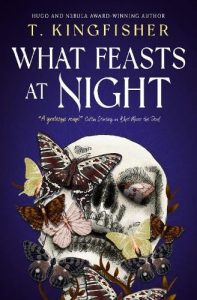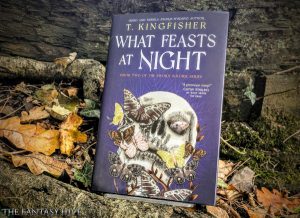WHAT FEASTS AT NIGHT by T. Kingfisher (BOOK REVIEW
“Blessed Virgin,” I whispered, even thought I couldn’t even hear myself. “Why must you keep sending me innocent monsters?”
For the spooky season, I resolved to read T. Kingfisher’s Sworn Soldier series. On finishing the first, What Moves the Dead, I dove straight into the next, What Feasts at Night.
 I have to confess that I struggled for a while to get into What Feasts, as it seemed to have such a different feeling to What Moves, and it took me quite a while to get used to the difference. I’d almost argue you could read What Feasts without ever reading What Moves – the characters make allusions to events but not in a manner which aids the story, although it would help understand Alex’s character perhaps. I think the key difference is the tone of the narration. What Moves had a quality to the narrative voice which I remember thinking was so different to Kingfisher’s fantasy novels, and it suited the setting so well. I felt the tone in What Feasts was more relaxed, a step more towards her fantasy voice, and it resulted in quite a big shift in the atmosphere.
I have to confess that I struggled for a while to get into What Feasts, as it seemed to have such a different feeling to What Moves, and it took me quite a while to get used to the difference. I’d almost argue you could read What Feasts without ever reading What Moves – the characters make allusions to events but not in a manner which aids the story, although it would help understand Alex’s character perhaps. I think the key difference is the tone of the narration. What Moves had a quality to the narrative voice which I remember thinking was so different to Kingfisher’s fantasy novels, and it suited the setting so well. I felt the tone in What Feasts was more relaxed, a step more towards her fantasy voice, and it resulted in quite a big shift in the atmosphere.
Despite all that, and viewing What Feasts as a story in its own merit, it is of course an excellent one, as you would expect from Kingfisher, with bone-chilling folk horror that evocatively (despite what I’ve said about the tone) drew you into the story. It’s quite the insomnia-inducing tale.
Alex and Angus return to Alex’s family’s hunting lodge in the wilds of Gallacia having invited mycologist Miss Potter to stay with them to study the fungi of Gallacia, the events of the previous book not being quite enough to dissuade her from her studies.
On reaching the lodge, Alex discovers kan’s caretaker absent and the lodge in a state of disrepair and abandonment. After some investigation, it transpires that Codrin died some months ago, and the villagers are acting rather suspiciously regarding the circumstances. It seems it’s believed that Alex’s lodge is being haunted by a moroi – a woman who lives in your dreams and who sits upon your chest whilst you sleep and steals your breath.
Alex spends the majority of the story firmly clutching to rational thinking and refusing to pay notice to superstitions of any kind. Ka hires a widow and her grandson to work at the lodge, and as the grandson sickens and the widow desperately tries to avert the danger using any and every folklore remedy she’s heard of, Alex still refuses to see what’s before kan’s eyes.
This is an element I struggled with, it’s always frustrating when a character can’t see what is so clear to the reader, but I can appreciate it’s in keeping with Alex’s personality and nature. The events of What Moves were horrific, but Alex has seen atrocities enough through war, and has categorised those events in a similar way to the horrors ka experienced in battle, rather than them being something supernatural. And it could be argued that (spoilers) a mycelial network infecting and then taking over the body of their host, effectively reanimating their corpse, is more an anomaly of nature than something of the supernatural.
A poet once wrote that the woods of Gallacia are as deep and dark as God’s sorrow, and while I am usually skeptical of poets, I feel this one may have been onto something.
But as I said, this is still an excellent story very well told. Alex’s native Gallacia is a fictional country, but seems to have its roots in Eastern Europe. With the deep forests and the nature of the folk stories I was picturing somewhere like Bavaria. And Kingfisher truly does bring this environment to life with a wealth of rich descriptive prose and local superstition. Whereas What Moves was an exploration of the Gothic and the uncanny, this time around Kingfisher explores folk horror, particularly that of the moroi from Romanian folklore. It’s not one I’m familiar with, but Kingfisher’s representation was utterly chilling.
Kingfisher wields personification to evocatively create a paranoid and claustrophobic world for Alex. I particularly liked Kingfishers description of the forest swallowing them whole, the imagery reminding me of Alex’s first entrance to the house of Usher, but also mirroring the idea of being consumed by something. Whilst highly atmospheric, there was also a mundanity to their lives for a large portion of the story, creating this juxtaposing sense of a comfortable and simple existence in the lodge, with the sense that things aren’t quite right. As the reader, you know things are going to kick off, so I did find myself waiting – things were rather tame up until the point they suddenly were not. Whereas with What Moves there’s a steady acceleration of events, the beats hit differently with What Feasts, almost as if Kingfisher was trying to lull us into a false sense of security before the nightmares began in earnest.
Again, the horror aspects, once they kicked in, were very disturbing, but the nature of the portioning out of events this time round meant I was able to read that section all in one go. I certainly don’t think I could have just set the book down and settled down to a night’s sleep once I was in the thick of it. Between the nature of monster, Kingfisher’s vivid descriptions, the sense of being unable to escape through your dreams… This is not a read before bed kind of story. An element I really loved about this book was the pyschology hovering over it. My favourite kinds of supernatural reads are the ones left open to interpretation, such as Sarah Walters’ The Little Stranger, or Laura Purcell’s The Silent Companions. The supernatural is such a dividing topic: do you believe in ghosts? This question is explored throughout the book, with Alex discussing the issue and ka’s frustrations with those who do believe with the local priest and doctor, figures representing educated and logical minds. It’s a long lesson for Alex, that the world is never so black and white, and by the end there still is no straight answer. It’s certainly an exhilarating, nightmarish tale.
What Feasts at Night is available now – you can order your copy on Bookshop.org

